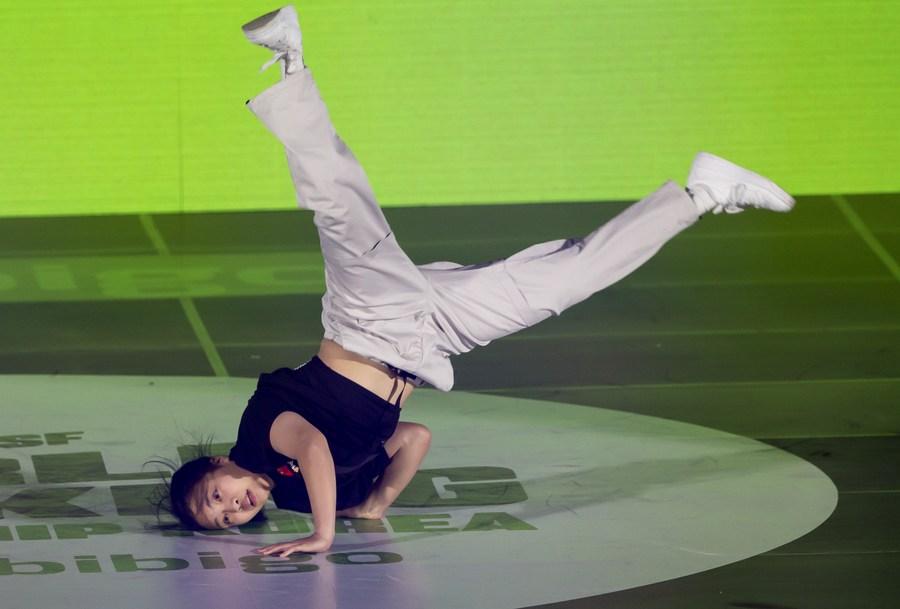
Stoked by the street-dance discipline's Olympic inclusion, China's stylish breakers are stepping up their moves by tapping deeper into Chinese culture for inspiration.

China's B-girl Liu Qingyi in action during Round 2 of Day 2 of the 2022 WDSF World Breaking Championship in Seoul, South Korea, Oct 22, 2022. (Xinhua/Wang Yiliang)
With strobe lights flashing to a pounding beat, the energy inside hip-hop club Playhouse in downtown Beijing was electric on June 19, when over 150 B-boys and B-girls battled it out at the opening leg of this year's Austrian Red Bull BC One China Cypher, a breaking tour that is visiting four Chinese cities this summer.
Renowned as the world's premier breaking competition, the series' Beijing opener brought the best out of the home crew. They each performed a 40-second solo in the preliminary round to try to impress the three-judge panel, led by Brazil's legendary dancer Fabiano Carvalho Lopes, better known as "Neguin" in the breaking world.
Sixteen B-boys, including one selected from an online audition, and four B-girls qualified for the final showdown, which featured a classic one-on-one format performed in a "cypher", where dancers square off against each other in pairs as the rest cheer and clap in a circle.
After earning the thumbs-up from the judges for their explosive power moves and unique styles, B-boy Nurxat, aka "Undercut", emerged triumphant in the men's final, while B-girl Wang Yufan dominated the women's field to get their qualification campaign for the July 9 China Cypher final in Shanghai off to a flying start.
Launched in 2004 as the world's first elite one-on-one breaking contest in Switzerland, Red Bull BC One made its China debut in 2014 with a qualifier event in Shanghai for the Asia Pacific regional final.
The tour has since connected China's growing number of breaking enthusiasts with the sport's top echelon, providing the likes of B-girl Liu Qingyi — a wild-card entry at last year's World Final — with the opportunity to learn from the greats and step onto the global stage.
Now with the discipline recognized as an official medal event at next year's Paris Olympics, the once niche activity can break new ground in China, reckons Wu Zefeng, aka B-boy Mao Zai, one of the three judges at the Beijing event.
"It's definitely a game-changer which is going to accelerate the whole development process of breaking in China," said Wu, who won silver at breaking's National Games debut in 2021.
"When I started, the resources and support that I had were nowhere near what the current generation enjoys," added Wu, who first practiced breaking in 2004 after being inspired by a video clip that caught his attention at a local music store.
"Red Bull BC One is here, the National Games accepted it and the Olympics have opened their arms as well.
"It's now a legit career pathway for all breakers to develop their hobby more seriously and more professionally."
Beijing's winning B-boy Nurxat, a native of Northwest China's Xinjiang Uygur autonomous region, expects Olympic inclusion to help dispel any negative perceptions about breaking.
"It's nothing but good news. For us as breakers, it gives us more possibilities and opportunities as a career prospect," he said. "It helps us break into the sports mainstream."
Identity matters
The winners of the four city cyphers will slug it out at the Shanghai final, where one place (each for B-boys and B-girls) will be up for grabs to represent China at the 2023 World Final in Paris on Oct 21.
As the Red Bull BC One's world champion in 2010, Neguin applauded the Chinese breakers' solid progress over the years, while urging them to delve deeper into their own culture to come up with more striking moves.
"China is one of the fastest growing countries in Asia to see the kids, the youth and even the older generation still pushing it to a better level. It's definitely putting China on the (breaking) map," Neguin told China Daily before the Beijing cypher.
"There are so many qualities for me to look into as a judge … sometimes some guys are good at executing moves but they're lacking emotion.
"It doesn't matter if you can do crazy movements or you have a perfect round. If your soul is not present then you're just lacking. It's like a body doll."
Citing his own experience of drawing inspiration from capoeira, a Brazilian martial art, Neguin suggested that Chinese breakers should incorporate more from their own culture and traditions into their moves to stand out on the world stage.
"There are so many layers for you to look in order to improve," said the Red Bull BC One All Star. "Sometimes improvement is not just about moves is about pushing the understanding of the message behind the art form. What is your storytelling and what is the culture that you are expressing."
Neguin's tips have resonated with China's young talents.
"We as Chinese breakers have a unique advantage due to our rich culture and history," said Wang, Beijing's winning B-girl.
"There's a lot that we've yet to tap into when it comes to the choreography of our moves, such as kung fu, tai chi and classical Chinese dancing.
"We are confident that the fusion between the East and the West will be a compelling combination in breaking."
